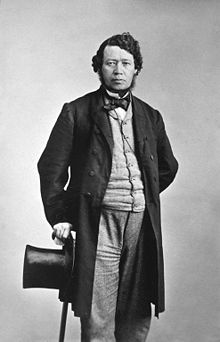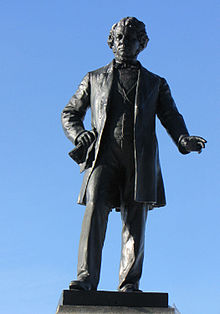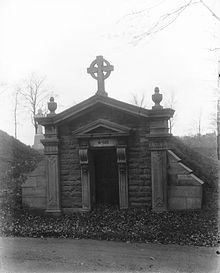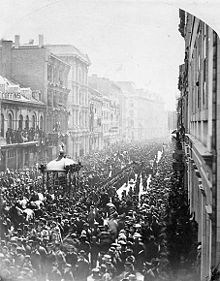- Thomas D'Arcy McGee
-
For the Quebec riding, see D'Arcy-McGee.
The Right Honourable
Thomas D'Arcy McGee
Member of the Canadian Parliament
for Montreal WestIn office
1867–1868Succeeded by Michael Patrick Ryan Personal details Born April 13, 1825
Carlingford, IrelandDied April 7, 1868 (aged 42)
Ottawa, OntarioPolitical party Liberal-Conservative Relations Frank Charles McGee, Great-nephew Signature 
Thomas D'Arcy Etienne Hughes McGee, PC, (April 13, 1825 – April 7, 1868) was an Irish Nationalist, Catholic spokesman, journalist, and a Father of Canadian confederation. He fought for the development of Irish and Canadian national identities that would transcend their component groups. He is, to date, the only Canadian victim of political assassination at the federal level.
Contents
Early life
Widely known as D'Arcy McGee, he was born on 13 April 1825 in Carlingford, Ireland, and raised as a Roman Catholic. From his mother, the daughter of a Dublin bookseller, he learned the history of Ireland, which later influenced his writing and political activity. When he was eight years old, his family moved to Wexford, where his father was employed by the coast guard. On the way his mother had an accident and died soon afterward. In Wexford he attended a local hedge school, where the teacher, Michael Donnelly, fed his hunger for knowledge and where he learned of the long history of English occupation and Irish rebellion, including the more recent uprising of 1798. It was in Wexford that he wrote his first poems and gained recognition as a talented public speaker. In 1842 at age 16 he sailed from Wexford harbour aboard the brig Leo, bound for the United States via Quebec, Canada. He soon found work as assistant editor of Patrick Donahoe's Boston Pilot, a Catholic newspaper in Boston, Massachusetts. A few years later he returned to Ireland where he became politically active and edited the nationalist newspaper The Nation. His support for and his involvement in the Irish Confederation and Young Irelander Rebellion of 1848 resulted in a warrant for his arrest. McGee escaped the country by steamship and returned to the United States.[1]
United States
In the U.S., he achieved prominence in Irish American circles and founded and edited the New York Nation and the American Celt (Boston). He grew disillusioned with democracy and the American republic, and emigrated to Canada in 1857. McGee remained a persistent critic of the U.S., of American institutions, and of the American way of life. He accused the U.S. of hostile and expansionist motives toward Canada and of desiring to spread its republican ideas over all of North America (see Manifest Destiny). McGee worked energetically for continued Canadian devotion to the British Empire seeing in imperialism the protection Canada needed from all American ills.[2]
Canada
In 1857 he set up the publication of the New Era in Montreal, Quebec. In his editorials and pamphlets he attacked the influence of the Orange Order and defending the Irish Catholic right to representation in the assembly. In terms of economics he promoted modernization, calling for extensive economic development by means of railway construction, the fostering of immigration, and the application of a high protective tariff to encourage manufacturing. Politically active, he advocated a new nationality in Canada, to escape the sectarianism of Ireland. In 1858, he was elected to the Legislative Assembly of the Province of Canada and worked for the creation of an independent Canada.
McGee became the minister of agriculture, immigration, and statistics in the Conservative government which was formed in 1863. He retained that office in the "Great Coalition", and was a Canadian delegate to the Charlottetown and Quebec conferences of 1864. At Quebec, McGee introduced the resolution which called for a guarantee of the educational rights of religious minorities in the two Canadas.
Fenians
Moderating his radical Irish nationalist views, McGee denounced the Fenian Brotherhood in America that advocated a forcible takeover of Canada from Britain by the United States. A faction of American Fenians sent an invasion force into Canada in 1866 that was repulsed by Canadian forces and arrested by the American authorities. Canadians, with Irish sympathizers in their midst, and spurred by numerous rumours of another, more massive invasion, lived in fear of the Fenians for several years.
Following the Confederation of Canada, McGee was elected to the 1st Canadian Parliament in 1867 as a Liberal-Conservative representing the riding of Montreal West.
On November 4, 1867 McGee delivered an oration titled "The Mental Outfit of the New Dominion." The address surveyed the literary status of Canada on the eve of the first Dominion Parliament. McGee's views were a combination of Tory principle, revelation, and empirical method. He suggested a national literature inspired by the creativity and ingenuity of the Canadian people.[3]
Assassination
On April 7, 1868, McGee participated in a parliamentary debate that went on past midnight. Afterward he walked to his Sparks St. boarding house at 2:00 AM. While trying to enter the boarding house (the door was locked from the inside and McGee was waiting for the landlady to open the door), McGee was purportedly assassinated by Patrick J. Whelan as the door was being opened.[1] He was given a state funeral in Ottawa and interred in a crypt at the Cimetière Notre-Dame-des-Neiges in Montreal. The government of Canada's Thomas D'Arcy McGee Building stands near the site of the assassination.[citation needed]
Patrick J. Whelan, a Fenian sympathizer and a Catholic, was accused, tried, convicted, and hanged for the crime. Decades later, his guilt was questioned and many[who?] believe that he was a scapegoat for a Protestant plot.[citation needed] His case is dramatized in the Canadian play, Blood on the Moon by Ottawa actor/playwright Pierre Brault. Patrick J. Whelan was hanged with an audience of 5,000 people. This was the last public hanging of Canada. The Canadian folk music group Tamarack's song "The Hangman's Eyes" was inspired by Whelan.[citation needed] The assassination of McGee is also a major component of Away, a novel about Irish immigration to Canada by Canadian novelist Jane Urquhart.[citation needed]
Impact of the assassination
Toner (1981) argues that the assassination was an important historical marker in Irish Canadian history. He argues that the Fenian element among the Canadian Catholic Irish was powerful in the 1860s. The reasons for Fenian influence included McGee's failure to rally moderate Irish support before his death, and the fact that no convincing moderate leader replaced McGee after his death. In addition the Catholic bishops proved unable to control the Fenians in either the U.S. or Canada; a final factor explaining the influence of the Fenians was the courting of the Irish Catholic vote by Canadian non-Catholic politicians. Behind all these reasons was Canadian fear of the 'Green Ghost': American Fenianism. After 1870, however, the failure of American Fenian raids into Canada, followed by the collapse of American Fenianism, finally led to the decline of Canadian Fenian power.[4]
Honours
A monument to McGee stands at Tremone Bay, in north County Donegal, Ireland near the bay from which he escaped to America in 1848.[5] There is a monument to him in his native Carlingford, County Louth, unveiled during a visit in 1991 by former Prime Minister of Canada Brian Mulroney and Irish Taoiseach Charles Haughey. His parents' grave in the grounds of Wexford's historic Selskar Abbey is marked by a plaque presented by the government of Canada.[citation needed]
On Sparks Street, in downtown Ottawa, the Thomas D'Arcy McGee Building is a prominent government-owned office building. D'Arcy McGee also has several schools named in his honour including: D'Arcy McGee Catholic School (elementary, Toronto Catholic District School Board, Toronto, Ontario) and Thomas D'Arcy McGee Catholic School (elementary, Ottawa-Carleton Catholic School Board, Ottawa, Ontario), D'Arcy McGee High School, Western Québec School Board (Gatineau, Québec) and Thomas D'Arcy McGee Catholic High School in Montreal which closed in 1992 (English Catholic School Board of Greater Montreal)
The Quebec provincial electoral district (riding) of D'Arcy-McGee is named in his honour, as is D'Arcy, British Columbia and two villages in central Saskatchewan: D'Arcy and McGee, located approximately 20 kilometres apart.
In 1986, a Chair of Irish Studies was set up in his honour at St. Mary's University, Halifax.
Further reading
- Burns, Robin B. "McGee, Thomas D'Arcy" in Dictionary of Canadian Biography online
- Phelan, E.J. Ardent Exile (1951)
- Slattery, T.P. The Assassination of D'Arcy McGee (1968)
- Wilson, David A. Thomas D'Arcy McGee: Passion, Reason, and Politics, 1825–1857, (2007), major scholarly biography
Books by Young Irelanders (Irish Confederation)- An Apology for the British Government in Ireland, John Mitchel, O Donoghue & Company 1905, 96 pages
- Jail Journal: Commenced on Board the "Shearwater" Steamer, in Dublin Bay ..., John Mitchel, M.H. Gill & Sons, Ltd 1914, 463 pages
- Jail Journal: with continuation in New York & Paris, John Mitchel, M.H. Gill & Son, Ltd
- The Crusade of the Period, John Mitchel, Lynch, Cole & Meehan 1873
- Last Conquest Of Ireland (Perhaps), John Mitchel, Lynch, Cole & Meehan 1873
- History of Ireland, from the Treaty of Limerick to the Present Time, John Mitchel, Cameron & Ferguson
- History of Ireland, from the Treaty of Limerick to the Present Time (2 Vol), John Mitchel, James Duffy 1869
- Life of Hugh O'Neil John Mitchel, P.M. Haverty 1868
- The Last Conquest of Ireland (Perhaps), John Mitchel, (Glasgow, 1876 - reprinted University College Dublin Press, 2005) ISBN 1-905558-36-4
- The Felon's Track, Micheal Doheny, M.H. Gill & Sons, Ltd 1951 (Text at Project Gutenberg)
- The Volunteers of 1782, Thomas Mac Nevin, James Duffy & Sons. Centenary Edition
- Thomas Davis, Sir Charles Gavan Duffy, Kegan Paul, Trench, Trubner & Co, Ltd 1890
- My Life In Two Hemispheres (2 Vol), Sir Charles Gavan Duffy, T. Fisher Unwin. 1898
- Young Ireland, Sir Charles Gavan Duffy, Cassell, Petter, Galpin & Co 1880
- Four Years of Irish History 1845-1849, Sir Charles Gavan Duffy, Cassell, Petter, Galpin & Co 1888
- A Popular History of Ireland: from the Earliest Period to the Emancipation of the Catholics, Thomas D'Arcy McGee, Cameron & Ferguson (Text at Project Gutenberg)
- The Patriot Parliament of 1689, Thomas Davis, (Third Edition), T. Fisher Unwin, MDCCCXCIII
- Charles Gavan Duffy: Conversations With Carlyle (1892)
- Davis, Poem’s and Essays Complete, Introduction by John Mitchel, P. M. Haverty, P.J. Kenedy, 9/5 Barclay St. New York, 1876.
- Additional Reading
- The Politics of Irish Literature: from Thomas Davis to W.B. Yeats, Malcolm Brown, Allen & Unwin, 1973.
- John Mitchel, A Cause Too Many, Aidan Hegarty, Camlane Press.
- Thomas Davis, The Thinker and Teacher, Arthur Griffith, M.H. Gill & Son 1922.
- Brigadier-General Thomas Francis Meagher His Political and Military Career, Capt. W. F. Lyons, Burns Oates & Washbourne Limited 1869
- Young Ireland and 1848, Dennis Gwynn, Cork University Press 1949.
- Daniel O'Connell The Irish Liberator, Dennis Gwynn, Hutchinson & Co, Ltd.
- O'Connell Davis and the Collages Bill, Dennis Gwynn, Cork University Press 1948.
- Smith O’Brien And The “Secession”, Dennis Gwynn, Cork University Press
- Meagher of The Sword, Edited By Arthur Griffith, M. H. Gill & Son, Ltd. 1916.
- Young Irelander Abroad The Diary of Charles Hart, Edited by Brendan O'Cathaoir, University Press.
- John Mitchel First Felon for Ireland, Edited By Brian O'Higgins, Brian O'Higgins 1947.
- Rossa's Recollections 1838 to 1898, Intro by Sean O'Luing, The Lyons Press 2004.
- Labour in Ireland, James Connolly, Fleet Street 1910.
- The Re-Conquest of Ireland, James Connolly, Fleet Street 1915.
- John Mitchel Noted Irish Lives, Louis J. Walsh, The Talbot Press Ltd 1934.
- Thomas Davis: Essays and Poems, Centenary Memoir, M. H Gill, M.H. Gill & Son, Ltd MCMXLV.
- Life of John Martin, P. A. Sillard, James Duffy & Co., Ltd 1901.
- Life of John Mitchel, P. A. Sillard, James Duffy and Co., Ltd 1908.
- John Mitchel, P. S. O'Hegarty, Maunsel & Company, Ltd 1917.
- The Fenians in Context Irish Politics & Society 1848-82, R. V. Comerford, Wolfhound Press 1998
- William Smith O'Brien and the Young Ireland Rebellion of 1848, Robert Sloan, Four Courts Press 2000
- Irish Mitchel, Seamus MacCall, Thomas Nelson and Sons Ltd 1938.
- Ireland Her Own, T. A. Jackson, Lawrence & Wishart Ltd 1976.
- Life and Times of Daniel O'Connell, T. C. Luby, Cameron & Ferguson.
- Young Ireland, T. F. O'Sullivan, The Kerryman Ltd. 1945.
- Irish Rebel John Devoy and America's Fight for Irish Freedom, Terry Golway, St. Martin's Griffin 1998.
- Paddy's Lament Ireland 1846-1847 Prelude to Hatred, Thomas Gallagher, Poolbeg 1994.
- The Great Shame, Thomas Keneally, Anchor Books 1999.
- James Fintan Lalor, Thomas, P. O'Neill, Golden Publications 2003.
- Charles Gavan Duffy: Conversations With Carlyle (1892), with Introduction, Stray Thoughts On Young Ireland, by Brendan Clifford, Athol Books, Belfast, ISBN 0 85034 1140. (Pg. 32 Titled, Foster’s account Of Young Ireland.)
- Envoi, Taking Leave Of Roy Foster, by Brendan Clifford and Julianne Herlihy, Aubane Historical Society, Cork.
- The Falcon Family, or, Young Ireland, by M. W. Savage, London, 1845. (An Gorta Mor)Quinnipiac University
References
- ^ a b Boylan, Henry (1998). A Dictionary of Irish Biography, 3rd Edition. Dublin: Gill and MacMillan. p. 246. ISBN 0-7171-2945-4.
- ^ J. G. Snell, "Thomas D'Arcy McGee and the American Republic," Canadian Review of American Studies 1972 3(1): 33-44
- ^ Germaine Warkentin, "D'Arcy McGee and the Critical Act: A Nineteenth-Century Oration," Journal of Canadian Studies 1982 17(2): 119-127
- ^ P. M. Toner, "The 'Green Ghost': Canada's Fenians and the Raids," Éire-Ireland When he was hanged, it was in front of 5,000 people and this was also the last time this was done in public in Canada. 1981 16(4): 27-47
- ^ Beattie, Darcy McGee Commemoration, 1848, p.5
External links
- Works by Thomas D'Arcy McGee at Project Gutenberg
- Biography at the Dictionary of Canadian Biography Online
- Parliamentary biography
- A History of the Irish Settlers in North America from the Earliest Period to the Census of 1850
- Michael Doheny. The Felon's Track. Dublin, M H Gill & Son, 1920.
 "Thomas D'Arcy McGee". Catholic Encyclopedia. New York: Robert Appleton Company. 1913.
"Thomas D'Arcy McGee". Catholic Encyclopedia. New York: Robert Appleton Company. 1913. Chisholm, Hugh, ed (1911). "D'Arcy McGee, Thomas". Encyclopædia Britannica (11th ed.). Cambridge University Press.
Chisholm, Hugh, ed (1911). "D'Arcy McGee, Thomas". Encyclopædia Britannica (11th ed.). Cambridge University Press. "D'Arcy McGee, Thomas". Appletons' Cyclopædia of American Biography. 1900.
"D'Arcy McGee, Thomas". Appletons' Cyclopædia of American Biography. 1900.- Radio documentary about the McGee murder, Canada’s first political assassination
- Thomas D'Arcy McGee in 1863
- Thomas D'Arcy McGee in 1866
- Thomas D'Arcy McGee's Mausoleum in 1927
Categories:- 1825 births
- 1868 deaths
- Irish poets
- Irish writers
- Assassinated Canadian politicians
- Canadian Roman Catholics
- Fathers of Confederation
- Conservative Party of Canada (1867–1942) MPs
- Irish emigrants to pre-Confederation Canada
- Members of the Canadian House of Commons from Quebec
- Members of the Legislative Assembly of the Province of Canada
- People from County Louth
- Irish diaspora politicians
- People murdered in Ontario
- Deaths by firearm in Ontario
- National Historic Persons of Canada
- 19th-century Irish people
Wikimedia Foundation. 2010.



